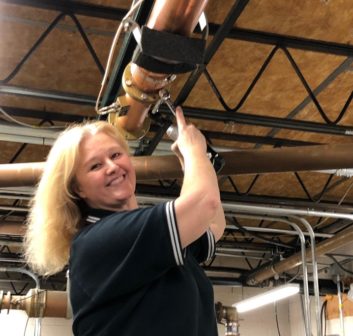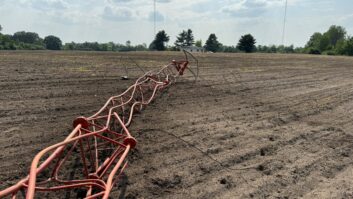
Beasley Media Group recently promoted Sherri Powers to chief engineer at its Detroit-based radio properties, overseeing the engineering and IT departments at the four-station cluster, which includes FM stations WCSX, WRIF, WMGC and WDMK, the last of which has three translators fed by its HD2.
Vice President and Market Manager Mac Edwards was quoted in the announcement as saying, “She epitomizes dedication to her craft and devotion to getting the job done right. Sherri has taken the lead on many significant projects in her storied career here.” That includes contracting with Greater Media to build new studios for WCSX(FM) and WRIF(FM) before she was hired full-time at the stations in 1998.
Radio World checked in with Powers to learn about her 29-year career to date. This is one in a series of interviews with radio technologists about their work.
Radio World: How have you reached this point in your career?
Sherri Powers: I’ve been very fortunate to be a part of Beasley Media, formally Greater Media, most of my career.
I started interning with WCSX(FM) in the summer of 1992. My first paid job was with WRIF, where I worked part-time setting up remotes. At the time, WCSX and WRIF were each with different companies.
I landed my first full-time engineering job in 1993 at WYCD, which was owned at the time by Alliance Broadcasting. While I was working there, I had the opportunity to help build the studios for Greater Media after they purchased WRIF. I finally officially came back “home” in 1998 and have been here ever since.
RW: What originally prompted your interest in broadcast engineering?
Powers: I actually got into engineering because I went to the wrong seminar! I signed up for an open house at Specs Howard School of Media Arts because I was really interested in video editing; but after hearing the benefits of engineering, I became intrigued.
I really like the idea of staying at a company for the long haul. Two of the things they kept stressing to the attendees was job security and the fact that engineers generally didn’t move around a lot. Upon completing my summer internship at WCSX, I was hooked.
RW: Any early mentors or particularly influential people in your career?
Powers: Yes, actually several. I have to say, all the chief engineers I’ve had made me the engineer I am today.
Bill Vellner, who at the time was the chief engineer at WCSX, gave me my first shot. He was willing to teach me anything I wanted to learn. Jeff Breitner, the chief at WYCD, also helped me realize my full potential. He taught me that radio was fun and would say, “It’s just radio, no one ever dies.”
The person I learned the most from was Mike Kernen. He’s not just a mentor or a boss, he’s my friend. I still talk to him several times a week. He’s actually helping me work on our transmitter build. He teaches me new things all the time. I wouldn’t be where I am today without him.
RW: How has COVID-19 affected broadcast operations for Beasley in Detroit, and what do you think the long-term implications for facility management are?
Powers: Thankfully, we were prepared and able to get ahead of things, before the state of Michigan shut everything down.
We were able set up one of our station morning show hosts, who lives in Canada, with all the equipment he needed to do a live show with remote gear before they closed the borders.
In addition, we updated our automation system to WideOrbit, to enable personalities to record live breaks and import them into the system. This way, the PDs could go in and program them.
In the future, I think we just need to be conscious of ways to do things even better. Everyone needs to work together to improve what we are doing today to make us be even better tomorrow.
RW: Any significant technical projects on the horizon?
Powers: Prior to COVID, we installed WideOrbit. We are still getting familiar with the automation system and all it can do. I also have some big transmitter projects going on, including installing a new 30 kW GatesAir FAX transmitter for WDMK, the station we just purchased last year. And I am working on moving our backup transmitter site for them to our transmitter site across town. In addition, I am taking one of the transmitters we used for 105.9 and making that the backup site transmitter for 105.1.
If just installing the transmitter wasn’t enough to do, we have to rewire all the remote controls and make sure everything works like it should. So it’s been quite busy.
RW: Anything else we should know?
Powers: My husband and I love to travel! Whenever we have the chance to get away, we love to go to Mexico. Every time we go, I always say I need to start my Spanish lessons again. I wouldn’t mind retiring there one day.
[Related: Read the ebook “Radio Engineering in Crisis” for perspectives on broadcast engineering careers today.]







